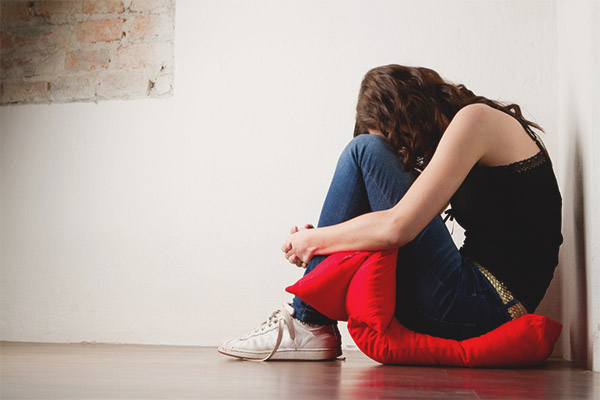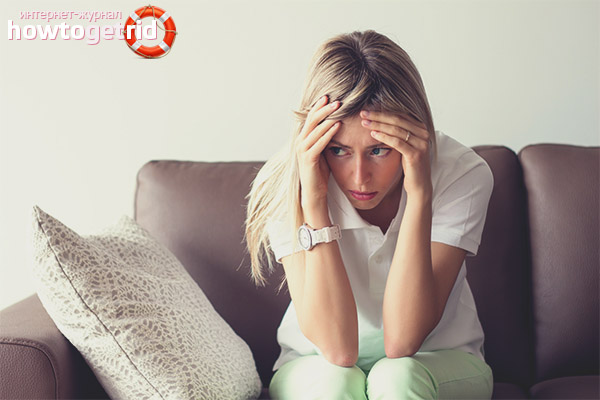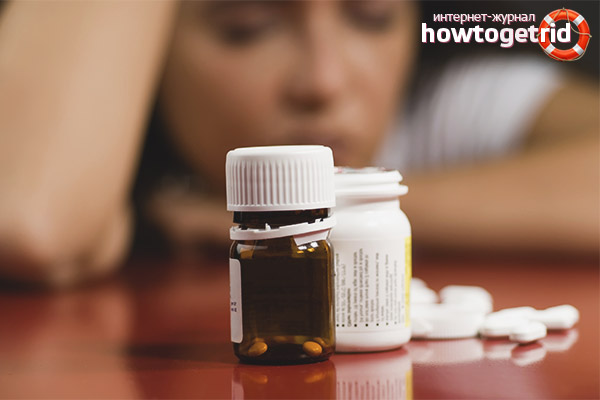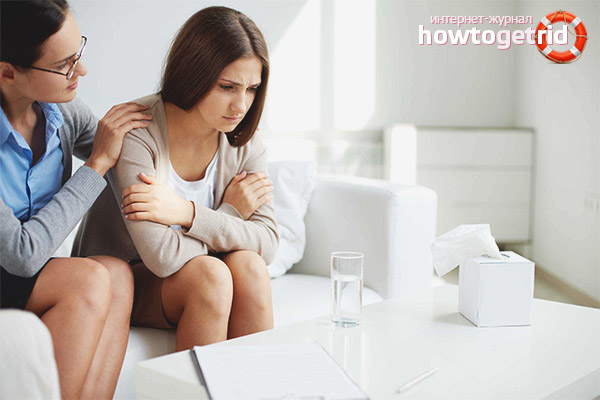The content of the article
- 1 Causes of Depression in Women
- 2 Biological factors
- 3 Social and cultural factors
- 4 Chemical processes and hormones in depression
- 5 Premenstrual dysphoric disorder
- 6 Postpartum depression
- 7 Main symptoms of depression
- 8 Treatment of depression
- 9 Medication Treatment
- 10 Depression Psychotherapy
- 11 Electroconvulsive therapy
- 12 How to help a friend or family member who is depressed?
- 13 Where to go for help
- 14 Video: 11 ways to quickly get out of depression
Periodically, each person feels too melancholic or sad, but these feelings are temporary and disappear in a few days. When a woman has a depressive disorder, it interferes with her daily life and normal work, hurts her and all those who care for her. Depression is a common but serious illness, and most people who suffer from it need quality treatment.
Depression affects both men and women.But among women, this condition is more often diagnosed. Many women with depressive illness have never sought treatment, although in most cases it would be very helpful.
Causes of Depression in Women
Depressive disorders are often manifested in women with no apparent reason. They may be associated with:
- despair;
- some obstacles in the way of life;
- daily difficulties;
- or exposure to certain medications.
The development of a depressive state is promoted by various factors:
- genetic;
- biological;
- chemical;
- hormonal;
- environmental;
- psychological;
- and social factors.
If a woman in the family previously had cases of depression, then she would have an increased risk of the disease. Genetic studies have shown that the risk of this condition is associated with a combination of several genes with environmental factors or several other factors.
Biological factors
- Premenstrual syndrome. Fluctuations in hormones can cause premenstrual syndrome, which is characterized by irritability, fatigue and strong emotional reactions.About 70% of women complain of such symptoms, accompanied by more or less pain.
- Pregnancy. Numerous hormonal changes that occur during pregnancy can lead to depression, especially in sensitive women. Also infertility or unwanted pregnancy can affect the development of this disease.
- Postpartum depression. Many young mothers suffer from a deterioration in mood. This is a normal reaction, which usually takes several weeks. In some cases, this process can last longer and turn into depression. This form of the disease is known as postpartum depression and is caused by hormonal changes.
- Menopause and perimenopause. Women are more prone to depression during perimenopause, the period preceding menopause. During this time, there are major changes in sex hormones.
Social and cultural factors
- A responsibility. Women are often overwhelmed with their daily activities. The more women play different roles (mother, wife, employee), the more vulnerable she becomes. Depression more often affects womenwho do not have support in their daily lives. Therefore, single mothers are three times more likely to suffer from neurotic depression than married mothers.
- Sexual or physical abuse. It can also cause depression in women. A high percentage of patients are observed among rape victims. Sexual harassment can also lead to this disease.
- Bad financial situation. Single mothers are often in a worse financial situation than women of their other social groups. Poverty is a stress factor that can lead to depression.
- Difficult emotional relationship. Divorced women are more prone to depression than those who have never been married. The reason for the appearance of a depressive state is often a lack of intimacy and agreement with her husband.
Chemical processes and hormones in depression
Chemical processes in the brain are considered a very important factor in depressive disorders. Modern brain imaging technologies, such as magnetic resonance imaging (MRI), have demonstrated that the brain of depressed patients is different from the brain of healthy individuals.The parts of the brain responsible for regulating mood, thinking, sleep, appetite, and behavior tend to work abnormally. But these changes are only a consequence of the disease, and not the cause.
Scientists are also studying the effects of female hormones, which change throughout life. Studies have shown that hormones directly affect brain areas that control emotions and mood. There are specific periods in the life of a woman that are of particular interest. These are puberty, premenstrual days, before, during and immediately after pregnancy (after childbirth) and the period immediately before and during menopause (perimenopause).
Premenstrual dysphoric disorder
Some women may be prone to the type of severe premenstrual syndrome called premenstrual dysphoric disorder or PMDD. During the week before menstruation, they usually suffer from depression, anxiety, irritability, and mood swings. Scientists are studying how an increase and cyclical reduction of estrogen and other hormones can affect brain chemistry and the onset of a depressive state.
Postpartum depression
Women are especially vulnerable to depression after childbirth, when hormonal and physical changes and new responsibility for caring for newborns can be very difficult to endure. Many newly-born mothers suffer from short-term moderate mood changes, known as "postpartum sadness." But some suffer from postpartum depression. This is a more serious disease that requires active treatment and emotional support for a young mother. According to studies, women after childbirth are at an increased risk of various mental disorders for many months after giving birth.
Main symptoms of depression
Not all women with depressive illnesses show the same symptoms. Moreover, the degree of manifestation, frequency and duration of symptoms can vary in each patient. Symptoms of depression include the following factors:
- persistent feelings of sadness, anxiety, or a feeling of "emptiness";
- feeling of despair and hopelessness;
- pessimism;
- anxiety and irritability;
- guilt;
- loss of interest in previously enjoyable activities or hobbies;
- increased fatigue and lack of strength;
- low concentration of attention;
- the emergence of difficulties in making decisions;
- insomnia or a very long sleep time;
- a sharp increase or loss of appetite;
- suicidal thoughts, attempted suicides;
- constant feeling of discomfort, headaches, cramps in the stomach (colic);
- problems with the digestive tract.
The main symptom of depression is a prolonged deterioration of mood and a general lack of joy in everyday life. If this is accompanied by a lack of energy and motivation for any actions, as well as low or negative self-esteem, this is the basis for seeking medical attention. However, it should be remembered that seasonal mood disorders, usually observed in autumn and winter, most often are not a sign of illness. Seasonal depression is observed in very rare cases.
Treatment of depression
Depression, like a disease, will in most cases not disappear on its own. It is possible to cope with this disease thanks to an accurate diagnosis established by a qualified physician and the right therapy, both pharmacological and psychotherapeutic.Do not be afraid of treatment. Modern drugs usually do not cause side effects or addiction. With the support of relatives and friends, it will be easier to overcome this disease.
The first step to proper treatment is to consult a doctor. Taking certain medications, viruses, or a disorder of the thyroid gland, can cause the same symptoms as depression. In addition, it is important to eliminate depression associated with another mental illness called bipolar disorder. Doctors will be able to make an accurate diagnosis based on the results of the examination of the patient, interviews with him and laboratory tests.
A doctor or mental health professional will conduct a full diagnostic assessment. He should receive a complete list of symptoms of the disease. For example, when they first appeared, what is their duration, strength of action, did they appear earlier. The physician must know if there have been any cases of depression in the patient’s family before. He will also ask if the person is drinking or using drugs and what the patient thinks about death or suicide.
As soon as an accurate diagnosis is made,A suitable treatment regimen is selected. The most common methods of treatment are drugs and psychotherapy.
Medication Treatment
Antidepressants normalize the work of chemicals in the human brain called neurotransmitters, including serotonin and norepinephrine. Other antidepressants regulate the functioning of a hormone like dopamine. Scientists have found that these chemicals affect the mood of people, but so far they are not sure about the exact way these hormones work.
For any type of antidepressant, the drug should be taken regularly, according to the recommended doses for at least three to four weeks, and sometimes longer. Only after that it will be possible to achieve the full effect of their use. The person should continue to take the medicine for the time indicated by the doctor, even if he feels better in order to avoid a relapse of depression.
The decision to stop taking medication should be made only after consulting a doctor, and should be carried out under his supervision. Some medications should be stopped gradually to allow the body to adapt.Although antidepressants are not addictive, if you suddenly stop taking them, a relapse may occur.
In the event that the prescribed medication does not give the desired effect, the patient should be ready to try another drug. Studies have shown that people whose condition has not improved after taking the first medicine have often cured after switching to another drug or supplementing an existing medicine with a new drug.
Depression Psychotherapy
There are several types of psychotherapy that can help those who suffer from depressive disorders.
Some types of treatment are short-term (from 10 to 20 weeks), and others are long, depending on the condition of the patient. It has been proven that the two main methods of psychotherapy are effective in treating depression. This is cognitive behavioral therapy and interpersonal therapy. By teaching new ways of thinking and behavior, this treatment helps people change negative thinking and behaviors. Therapy helps people realize and resolve problematic personal relationships that can cause or aggravate depression.
Psychotherapy may be the best treatment option for mild to moderate depression. But for severe cases or for certain people, this is not enough. Studies have shown that for adolescents, a combination of drugs and psychotherapy may be the most effective treatment option for severe depression and reducing the possibility of its recurrence.
Electroconvulsive therapy
Before the procedure, the patient takes a muscle relaxant and receives a short-term anesthesia. Thus, a person does not feel the electrical impulses that affect the body. As a rule, a person is exposed to ECT several times a week, and he often needs to take an antidepressant to supplement the treatment process and prevent relapse.Some people need only a few ECT sessions, while others may need periodic procedures for one year.
ECT can cause some short-term side effects, such as disorientation and memory loss. But, as a rule, these side effects disappear soon after treatment. Before deciding to be treated in this way, you should discuss with your doctor the possible risks and benefits.
How to help a friend or family member who is depressed?
If you have a friend or a loved one suffering from depression, the first thing to do is to help him in obtaining an accurate diagnosis and treatment. You may have to accompany the woman to see a doctor. Support her by any means so that the patient does not refuse treatment. Sometimes you have to convince the patient to choose a different type of treatment if after six to eight weeks there is no improvement.
In addition, you can do the following:
- communicate with the woman and listen carefully to her;
- offer emotional support, show understanding and patience.
One should never ignore comments about suicide, and such words must be passed on to a general practitioner or a doctor.
Invite your friend or family member to take a walk, go on a tour or visit other events. If the patient refuses the invitation, continue to try, but do not push him. Remind him that depression will disappear over time with treatment.
Where to go for help
If you have depression, you can consult with your family doctor, who will give useful tips where to go with a similar problem. Psychiatrists, psychologists, social workers can also help with consultation. You can contact the clinics, mental health centers, psychiatry departments of hospitals and clinics, local medical or psychiatric associations, social support groups.
Video: 11 ways to quickly get out of depression













To send